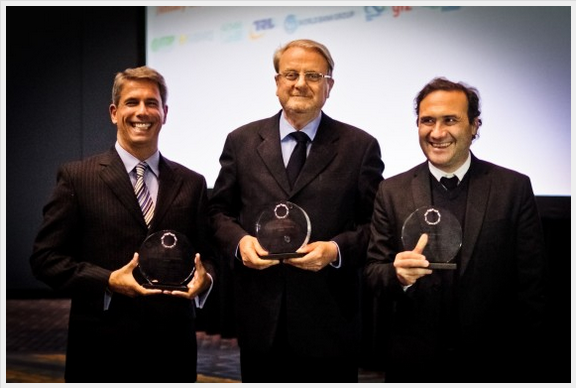
Photo: Laudemar-Aguiar-Marcio-Lacercda-Ciro-Biderman
Belo Horizonte, Rio de Janeiro and São Paulo win 2015 Sustainable Transport Award
20 January 2015
by Richard Forster
Belo Horizonte, Rio de Janeiro, and São Paulo have been announced as the 2015 Sustainable Transport Award winners, the first ever award to result in a three-way tie, giving credit to the scale and substance of Brazil’s achievements in increasing mobility and enhancing quality of life in its major cities.
“Each of the three Brazilian winners made a package of interventions in the last year to improve their cities; opening new BRT corridors, optimising existing bus services, implementing cycling lanes, improving walking conditions, dealing with parking and reforming land use codes to support greater building density near transit,” Michael Kodransky, Chair of the Sustainable Transport Award Committee, told Cities Today. “While there were many other nominations, no other cities submitted nominations that were so exhaustive in what they’ve accomplished in such a short time. Brazil is the birthplace of bus rapid transit, so perhaps its no surprise that Brazilian cities continue moving ahead so boldly to be liveable and equitable places.”
In hosting the World Cup and planning for the Olympics, Brazilian cities have undertaken massive transit improvements, the results of which are starting to be seen on the ground.
In 2014, Belo Horizonte implemented the first projects of their comprehensive Mobility Plan: a new, gold-standard bus rapid transit system, MOVE BRT, which began operation on two corridors covering 23 kilometres. The city also revitalised its downtown, creating pedestrian-only streets, and implementing 27 kilometres of their planned bikeway network.
“We in Belo Horizonte are working every day to make life better,” said Marcio Lacerda, Mayor of Belo Horizonte. “We understand that good transport is fundamental to improving life for everyone in our city. This award means so much to us because it indicates that we are getting better, and that the work is worth it.”
Rio de Janeiro has massively invested in public transport over the past few years. In 2014, the city opened the second of four BRT systems planned ahead of the 2016 Olympics, Transcarioca. The new, 39-kilometre corridor draws 270,000 daily users, keeping the city on track to achieve the goals of its mobility plan by 2016.
“Rio is transforming,” said Laudemar Aguiar, Head of International Relations for Rio de Janerio. “By 2016, 60 percent of Cariocas will have access to mass transportation. In 2009, that number was only 18 percent. Every day we are building more BRT, more LRT, more metro, connecting the city, and making it better for everyone.”
São Paulo significantly expanded its cycling network in 2014, and implemented 320 kilometres of exclusive bus lanes, increasing average bus speeds by 21 percent. The city is on track to have 400 kilometres of cycle lanes implemented in 2015, part of an overall 500-kilometre network. These are just the first steps of an ambitious master plan, which has made São Paulo the first megacity to eliminate parking minimums and replace them with parking maximums citywide.
“Too many cities say they don’t have enough money for transport projects, but it isn’t about the money,” said Ciro Biderman, Chief of Staff for SPTrans (São Paulo Transporte). “Building bike lanes doesn’t cost much. It’s about being willing to have the fight to get it done. It’s about political will.”
Established in 2005, the Sustainable Transport Award has been given annually to a city that has implemented innovative and sustainable transport projects in the past year. These strategies must improve mobility for all residents, reduce transport greenhouse and air pollution emissions, as well as improve safety and access for cyclists and pedestrians.










